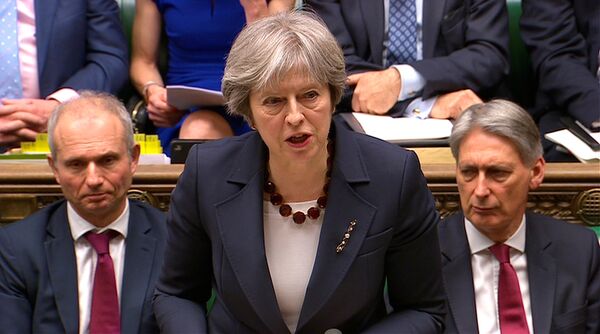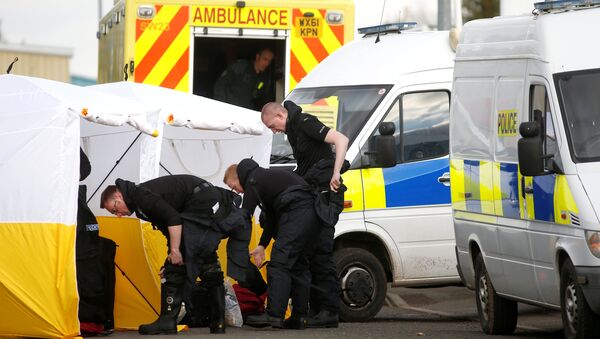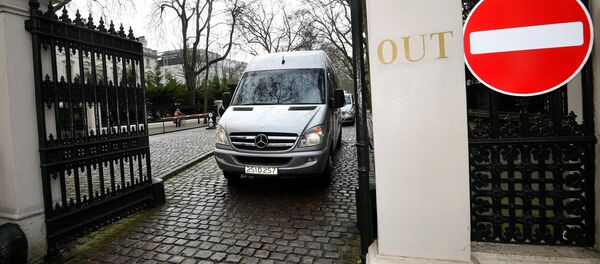Let's just imagine though what might happen if Agatha Christie’s famous fictional detective did- in defiance of the Thought Police- head down to Wiltshire, along with his faithful sidekick Captain Hastings.
What sort of questions would he be asking- and what conclusions would he come to?
In absence of evidence, we definitely need Poirot in Salisbury! pic.twitter.com/EHTlEQmcPp
— Russian Embassy, UK (@RussianEmbassy) 18 марта 2018 г.
For a start, Poirot, a man who was as careful with his words as he was with pruning his mustache, wouldn’t have rushed to blame Russia, or anyone else, until he had first conclusively established guilt. He’d be wincing at Foreign Secretary’s Boris Johnson’s recent oafish utterances. ‘Oh, mon ami!, how did they pick this man to be Foreign Secretary!’ he’d be saying to Hastings. ’I don’t know Poirot. I was Eton with Jonners and always thought he was a bit of an ass then‘, Hastings would probably reply.
The first thing Poirot would have tried to establish was the scene of the crime. Where did Sergei and Yulia Skripal ingest the poison?
3. Ни один из них не имел симптомов отравления и не один не нуждался в лечении.Ни в одном анализе крови не найдено отклонений. Ни один член общественности не пострадал от воздействия химических агентов.
— Ластик и Абырвалг (@ValLisitsa) 17 марта 2018 г.
Подписано: Стивен Дэйвис. Врач-консультант скорой помощи больниц Солсбери. pic.twitter.com/tKwTjYP8nt
The Times newspaper- the one so keen on attacking ‘fake news’ published a report last week which claimed ’Poison exposure leaves almost 40 needing treatment’. But this was corrected in a letter to the paper from Dr. Stephen Davies, Consultant in Emergency Medicine at the Salisbury NHS Foundation Trust. Dr Davies actual words were: ‘May I clarify that no patients have experienced symptoms of nerve agent poisoning in Salisbury and there have only ever been three patients with significant poisoning. Several people have attended the emergency department concerned that they may have been exposed. None has had symptoms of poisoning and none has needed a treatment….No member of the public has been contaminated by the agent involved‘
Poirot would have read Dr. Davies’ letter carefully and recognized its importance. If just three patients had 'significant poisoning', it’s unlikely that the poison was administered in a public place, like a restaurant, or sprayed in the street. We’re also told that Novichok, the nerve agent the British government says was used, acts very quickly, with its effects usually taking hold 'within 30 seconds or two minutes of contact.'

So how did the Skripals survive- at least to the time of writing?
Poirot would be trying to establish the exact movements on the day in question not just of the Skripals but of the other person poisoned, the gallant Detective-Sergeant Nick Bailey.
Metropolitan Police Assistant Commissioner Mark Rowley stated in an interview that ‘a police officer who was one of the first to attend the scene in response to the incident, is now also in a serious condition in hospital’.
But later, there were reports that Det.Sgt Bailey had also visited Mr Skripal’s house.
If Bailey had been made ill by going to the bench, how was he able to later go to the house, given how quickly Novichok works? Or was the dose he received so small that it had a delayed effect?
One theory doing the rounds is that the poison/nerve agent may have been planted in Yulia Skripal’s suitcase (she had returned from Moscow the day before). But, if the Skripals were poisoned at home, how on earth could they make it to town, to have a meal and a drink? Could the poison had been in an item in the suitcase which had only been opened when the pair were out and about in Salisbury? But they were found on a bench- and there have been no reports of any packaging found next to them. It would be logical to assume that they had been sprayed with the noxious substance while walking along, but if this was the case why no release of CCTV footage to enable the public to identify suspects? And once again, why have no other members of the public needed treatment, nor indeed the doctor who attended Yulia Skripal for around half an hour- and who is quoted here as saying that ‘there was no sign of any chemical agent on Ms Skripal's face or body’
Poirot would also be asking who had the best motive to carry out the attack. The Russian one was that Skripal was a traitor who had sold the names of agents working undercover in the west to the British security services. Killing Skripal would send out a strong message out to any others thinking of betraying Russia. But the point which I’m sure would be troubling Poirot, is the timing, which could be the key to the whole case.
The Russian authorities, had they been so inclined, had ample opportunity to bump Skripal off when he was in a Russian jail. And if there had been a desire to target his daughter Yulia too, then why not do it Moscow, where she has lived since 2014, and not in a foreign land whose government have been looking for any excuse to get at Russia? There’s also the etiquette of spy prisoner swaps to consider. You don’t kill agents who have been exchanged. As Professor Anthony Glees, has acknowledged, Russia takes spy swaps ’very seriously’. http://uk.businessinsider.com/sergei-skripal-poisoning-russia-spy-swap-deals-at-risk-2018-3
So why break the rule now?
‘You know what Hastings? The more I ponder this crime, the more I think the solution is to find out why it took place when it did’,is what I’m sure Poirot would be saying.
An attempt to kill Skripal on British soil on 4th March 2018 was the worst possible timing from the Kremlin’s perspective. It’s not just that the Russian Presidential elections were coming up in two weeks time, or that the football World Cup in Russia was just three months away. Another important event happening that week has generally not been remarked upon. On Tuesday 6th March, Magnitsky Act sponsor Bill Browder, and UK journalist Edward Lucas, another vociferous critic of the Kremlin, was due to address UK MPs.
The Kremlin would have known this as the event was hardly a secret. So why make Browder and Lucas’ case for imposing tougher sanctions on Russia much easier by ordering an assassination on British soil just 48 hours earlier, knowing full well that the attack would be blamed on Russia! In this of all weeks, Putin would have been keen to give UK Parliamentarians no extra cause to pursue an anti-Russia campaign.
Another thing that would get Poirot’s ‘little grey cells‘ working overtime is the nerve agent that the UK government tells us was used. Why would the Russians have chosen to use Novichok-which as George Galloway has pointed out would- given UK government claims- be tantamount to leaving a calling-card, a pair of boots with snow on them and a bottle of vodka, at the scene? Ah, that’s easy- Captain Hastings might say (and Andrew Neil in fact did say); the Russians wanted to leave their calling card to deter future traitors. Again though, if true, why do it now, knowing that it would lead to renewed efforts to take the World Cup away from Russia- and RT and Sputnik to be taken off air in the UK?
Knowing it would mean more sanctions and diplomatic expulsions at the very least- and threaten @RT_com ‘s ability to broadcast in UK? Doh! https://t.co/P1AoInq1Yg
— Neil Clark (@NeilClark66) 14 марта 2018 г.
A Russian-government authorised attack on 4th March would only make sense if Skripal needed to be put out of action very quickly. But what new information might he possess that was so important to suppress — at the great risk of plunging relations with the west to a dangerous new low? After all he had already told British Intelligence everything they had wanted to know.
The timing of the incident may have been very bad for Russia but conversely it could not have been better for those wishing her harm. Not only for certain states who are frustrated that Russia has effectively blocked regime-change plans in Syria-a crucial part of the neocon project, but also anti-Putin oligarchs and mafiosos, who would love to see a ‘regime change’ in their homeland.
It was also good timing for UK Prime Minister Theresa May- with local elections coming up soon in the UK and her party struggling in the polls. The incident has been used to attack the opposition Labour leader and the Establishment’s domestic enemy number one Jeremy Corbyn for his failure to be as gung-ho on Russia as the government.

As could have been predicted, post-Salisbury, British MPs are falling over themselves to push through a new tough ‘Magnitsky Act’. The Neo-Con War lobby wasted no time to renew their calls for the World Cup to be taken away from Russia and for RT and Sputnik to be banned. If we ask the all-important question ‘Cui bono’ from Salisbury the answer clearly isn’t Russia- but her enemies.
Poirot would draw up a list of suspects and not rule anyone out. He’d be curious as to why the UK hadn’t given the Russians a sample of the nerve agent they said was used as requested by the Kremlin.
I’m sure would raise his eyebrows at the latest lurid claim from Boris Johnson in which the Foreign Secretary claimed that ‘within the last 10 years‘ Russia had been creating and stockpiling Novichok. Poirot would note the comments on this by the former UK Ambassador to Uzbekistan Craig Murray, most particularly that the UK said nothing about this Novichok programme when the OPCW, a UN body, completed the destruction of Russia’s chemical weapons stocks last year.
Boris Johnson Issues Completely New Story on “Russian Novichoks” — Boris Johnson has attempted to renew the faltering case for blaming Russia ahead of the investigation into the Skripal attack, by issuing a fundamentally new story that completely changes https://t.co/5yPCqLPr22
— Craig Murray (@CraigMurrayOrg) 18 марта 2018 г.
He would note too, as Craig Murray has done, that in the House of Commons last Wednesday, Prime Minister May had said that the nerve agent was ‘of a type developed by Russia'. Not that the actual agent used had been made in Russia. We now know that other countries —and not just Russia- could have manufactured the agent.
He would also be interested in a tweet from the former Scotland Yard detective and counter-terrorism intelligence officer Charles Shoebridge- on how Novichok was used by a Russian scientist in November 2017 in a UK/US tv drama
For 20 years almost nobody heard of #Novichok. Then in Nov 2017 in a UK TV drama a Russian scientist used it to kill his colleagues. Just weeks later, UK alleged was used on #Skripalhttps://t.co/aUf5JRGAtw
— Charles Shoebridge (@ShoebridgeC) 16 марта 2018 г.
Coincidence? Perhaps, but which most UK media have avoided any mention of
Is that where the idea to use this particular nerve agent in the attack (if indeed Novichok was used), came from?
Poirot would be interested if Skripal‘s house had CCTV. He’d want to visit the hospital in Salisbury and chat to police officers who are on the case. He’d be asking Theresa May why, if she really thinks ‘Russia did it’, are the 23 ‘Russian diplomats who we’re told are really ‘undeclared intelligence officers‘, being expelled without being questioned by the police. 'There are so many contradictions in this case, Captain Hastings, don‘t you agree? Something is not quite right…’
I’m sure that given his track record M. Poirot would eventually discover the truth.
The views and opinions expressed by Neil Clark are solely those of the author and do not necessarily reflect those of Sputnik.
Follow Neil Clark @NeilClark66
Support his AntiStalker CrowdFund



